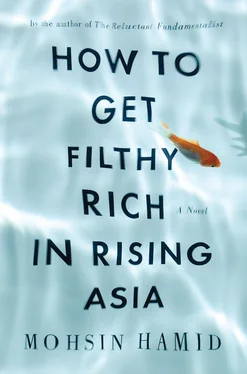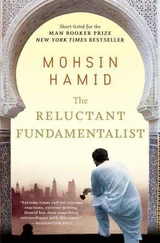You call your accountant into your room and shut the door. Outside, through a tawny pane, you see the top of an overloaded bus snarled in telephone wires. Shouting rises from the street below.
“How bad?” your accountant mumbles.
“Gone.”
“Completely?”
You manage to choke off a string of profanities. “I’ll need to replace it. Will we be fine for salaries?”
“We have enough cash.”
The right half of your accountant’s face is stiff from stroke. He is not actually qualified as an accountant, but this does not matter to you. As is customary, you bribe the tax man, and your cooked books serve merely as a starting point for negotiations. What does matter to you is that he be adept with numbers, which he is, having spent decades as a clerk at one of the city’s more reputable accountancies.
Your accountant suspects he has not long to live. His visage has already become a mask, its partial rigidity reminding him of his father’s in the hours following his father’s death, the body bathed but not yet committed to the soil. He often imagines the feeling of tiny blood vessels bursting in his brain, a sensory effervescence, like the prickles of a foot gone to sleep. But he bears his fate for the most part with equanimity. His sons are employed. His daughter is married, to you, a fellow clansman with proper values and excellent prospects. He has therefore completed what a father must most importantly complete, and while the yearning for another chance at youth tempts us all, he is strong enough to hold fast to the truth that time works not that way.
Because you have a lot to do and further because you believe it sends a motivating signal, you depart late this evening. A crescent moon hangs low in the sky, and a pair of flying foxes passes overhead, their giant bat wings thudding through the air. You drive along your customary route, listening to music on the radio.
At an intersection a boyish motorcyclist with delicate, curly hair taps on your window. You lower it to find a pistol pointed at your cheek.
“Get out,” he says.
You do. He leads you to the side of the road and tells you to lie facedown in the dirt. Traffic comes and goes, but no one stops or pays any attention. The smell of parched soil fills your nostrils. He places the muzzle against your neck, where your spine meets the base of your skull, and twists it from side to side, grinding. It presses painfully into skin and bone.
“You stupid mother’s cock,” he says, his voice high-pitched, almost prepubescent. “You think you can buttfuck your betters?”
Your lips move but no sound emerges. You feel phlegm hit your scalp, neutral in temperature and thick like blood.
“This is a warning, sisterfucker. You only get one. Remember your place.”
He walks to his motorcycle and rides off. You do not stand until he is gone. You perceive a sharp discomfort in your upper vertebrae and notice that your car door has remained ajar, the engine idling this whole time. You pop open the glove compartment. Your revolver. Useless.
The ultimatum you have just received comes from a wealthy businessman, part of the city’s establishment, who among other things owns a rival bottled-water operation, and onto whose turf you have begun to expand. He is powerful and well connected. So you are frightened, but not only frightened, you are also angry, seethingly furious, both emotions combining to cause you to tremble as you drive, and to think, over and over, while fighting a rising sense of dread, I’ll show that fucker, I’ll show him.
How you will show him, though, remains unclear.
You pull up at your home, a newly constructed townhouse in an unfinished, mid-price development, one of a choice of four designs repeated in multiple blocks of twelve. The trees on your street are still saplings, knee high, bound to wooden stakes for support against the wind. When your wife lets you in, she looks at you with concern and asks what on earth happened. You say it is nothing, perhaps something you’ve eaten. Later that night she hears you vomit in the bathroom.
Having recently turned twenty, your wife is a little less than half your age. She believes she has married well, the difference in years notwithstanding, your gap being the same as that between her parents. She grew up in better circumstances than you did, but not in circumstances as comfortable as those she currently enjoys. This, she feels, was to be expected, for she has always been regarded a beauty, with pale skin and a wide, sensuous mouth, and in arranged marriages looks such as hers fairly command a price.
In exchange for her assent to the agreement brokered between your accountant and you, she attached two conditions, first that she be allowed to complete her university, a lengthy course in law, and second that she not be tasked with producing any children while studying. She attached these conditions partly because she wanted them fulfilled and partly to test her power. You acceded, and you are honoring them.
She imagined during the negotiations that she was also testing your desire. Of this, however, she is now less sure. For while sex was a daily, sometimes twice-daily, occurrence in the first weeks of your marriage, it quickly subsided to a rhythm of about once a fortnight. She ascribes this to your being a man in his forties, even if her experience of your initial frenzy does leave her in some doubt. Nonetheless, she continues to look up to you, and feels ready for you to spark in her the flames of romantic love, although she has begun to wonder when you will take the time to do so.
The day you texted the pretty girl on her mobile to inform her of your impending wedding, the pretty girl was surprised, given how little you and she had come to speak in recent years, by the strength of her sadness. She had not consciously been aware of her expectation that you would always wait for her, and while her thoughts occasionally alighted upon memories of you, she had no specific plans for further encounters like the evening you shared in the hotel. So she was caught unsuspecting by her sorrow. Still, she texted you back to wish you happiness. And then, as usual, she did her best to master her feelings and buckle down to work.
A popular cooking show on TV has brought the pretty girl considerable success, which is all the more remarkable since she has never been much of a cook. But she packages a sassy, street-talking persona with a spicy nouveau-street cuisine, combining the dialects of her childhood with the skills of her assistant chefs to charming and profitable effect.
She lives alone in an elegant, minimalist bungalow, not far from the sea, reunited with a generous income after a dip in her fortunes. Her fears of a return to poverty have receded. She recognizes that her celebrity was erected on a foundation of appearance, and she is not blind to the reality that appearances shift. But she believes that there are ways to lift celebrity free of its foundations, indeed that beyond a certain point, celebrity, like a cloud, can become seemingly its own foundation, billowing, self-sufficient, resolutely aloft. Unburdened by the commitments of extended monogamy, she dedicates immense time to this goal, to perpetual publicity campaigns, to those who will sustain her future. To, in other words, her viewers.
Among these viewers is your wife, who finds the pretty girl endearing, like a cool aunt, and her recipes simple and tasty. So you often come home to discover the pretty girl talking to your wife in your living room, their eyes locked across the ether, and when you inevitably ask your wife in a brusque tone to change the channel, she does so with a smile, assuming it is because you, a typically macho man, are uninterested in the wonders of the culinary arts.
You make no mention of your gunpoint warning to your wife, but it leads you to request an audience with the local head of an armed faction to which you and other traders in your area pay protection money. You have not personally seen him before, but as a member of the same clan you expect him to agree to a meeting, and indeed he does not keep you waiting for long.
Читать дальше












